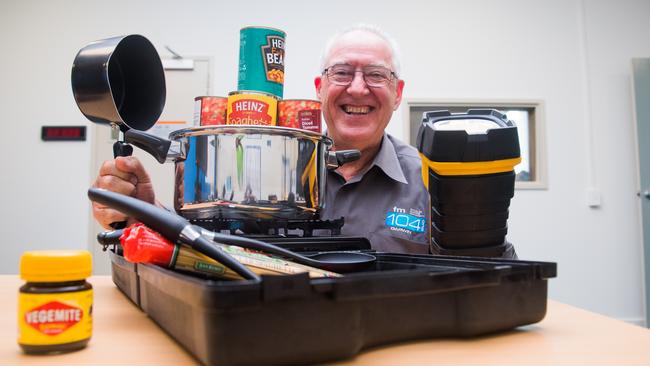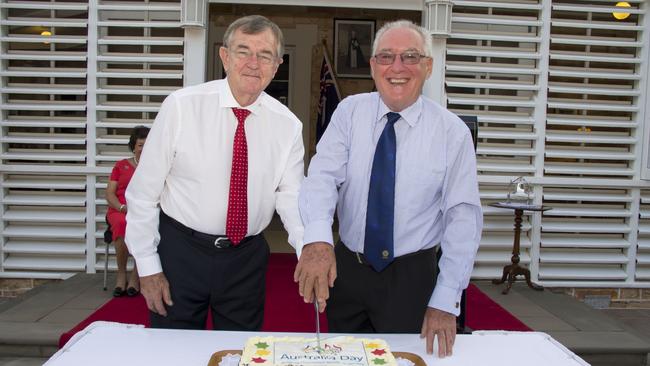“When you think it is the end a few things go through your mind. You get a bit religious — just in case — and then we all just got very calm.
“If it happens, it happens.”
Cyclone Tracy’s deadly winds lashed at the walls of the new home Daryl and Maureen Manzie had bought in the northern suburb of Moil.
They hunkered down in the hallway with their three kids — new daughter Lisa, just four weeks old, Monique, 21 months and Simon, 4.5.
“We were sitting in the passageway because I figured there were two walls everywhere you look between us and outside,” Daryl said.
“The wind was just horrendous and it built up, then it was just quiet — you knew the eye was above you.
“I went out with a torch and the house was in good nick — just a little bit of tin flapping in the corner.”

But once they eye passed, the cyclone’s winds pelted their home from the opposite direction.
“We’re sitting there and suddenly you could hear this noise — it was like a train coming through a tunnel and getting louder and louder, then next minute it was like our house was hit with a bomb.
“It was just massive destruction.”
The family dragged themselves to the bathroom and took safety under covers in the bath tub.
“We were all in there with a little baby and … the house more or less disintegrated around us,” Daryl said. “But the walls of the bloody bathroom stayed up.”
The roof didn’t. It collapsed on them, but the height of the bath saved them from injury.
“The floors were heaving up and down. The whole place was just bedlam, it was pretty scary stuff. I thought, well, we’re dead.”
Gradually the storm died down. Daryl lifted the roof to open the door and see the house stripped away. Only the floorboards remained.
“Stupidly I said to Maureen ‘the carpet’s gone’,” he said.
“She said ‘what?’
“I said ‘there’s no carpet’.
“She said ‘there’s no house!’”
The pair looked through the hole left by their smashed louvres to the decimated town beyond.
“It was just like Hiroshima,” Daryl said.
“I said to Maureen, I think we’re the only people left alive — no one could survive that.”
“Then we heard a voice — ‘Yoo-Hoo!’”
It was their next door neighbour. Gradually more and more neighbours emerged from the wreckage or were freed from the debris.
As a policeman Daryl set to work immediately and took the family to the local primary school as some semblance of order in the chaos was formed.
Maureen remembers how challenging it was to leave Daryl behind when she and the three children were evacuated.
They bounced around in a police car and Simon, the eldest, set the police siren going. The next six months proved to be a challenged.
Daryl worked 4pm-12am so he could dedicate his mornings to rebuilding a home so his family could return.
Meanwhile, Maureen bounced from family to family in Melbourne until she rented a house for about three months.
“We just wanted to be back together again, that was the most important thing,” she said.
“The biggest challenge was the children not understanding what had happened. One minute we were in Darwin, the next we were in Melbourne without Dad.
“Mentally for me too it was hard — having to cope on your own as a single parent and not knowing what was happening.”
After six months of phone calls the family was reunited.
Daryl and Maureen met when they were about 17. Daryl played guitar in a rock’n’roll band. Maureen was a friend of the singer.
“The band was called The Silhouettes; we were just four neighbourhood boys,” Daryl said.
“We used to practice in the garage and all the neighbours would be throwing rocks over the roof saying ‘shut up’.”
Neither described it as ‘love at first sight’. But it’s obvious Daryl remembers the exact moment he first saw her.
“She looked very nice and she was nice to talk to,” he said with a coy smile and a pause, recalling the moment.
It was Maureen who lured Daryl to the Territory. She had gone on a working holiday venture around the country with a friend and immediately noticed the potential of the tropical north.
She flew back to Melbourne and the pair drove up to Darwin in their Valiant. Daryl soon found himself applying for the police force in their first intake of locals.
“They were really worried, thinking ‘if you’re local you know too many people here and you tend to let them go and there’s all these criminals here and we don’t want you mixing’,” he said.
“But I really enjoyed the police force — it was a very, very exciting job with some really interesting people.
“Darwin was going through an interesting period — you become aware very quickly the Territory was a colony of Canberra, and you had no ability to do much.
“They’d bring people in for two-year stints and they’d come out with all their fancy ideas of how things work, then when it would all start to fall apart they’d leave and someone else would come in and they’d get rid of all that and they’d have their ideas.
“If something was done that wasn’t good or affected you, there was no one to complain to.
“No one had responsibility for anyone, so you start to become feral.
“There were no senators, one person in the house of reps, but he wasn’t allowed to speak on any issues unless it was Territory issues, so you were more or less shut-out of the democratic system.”
The Territory was finally allowed a fully elected assembly in 1974, but then Tracy hit.

Daryl’s passion for a better Territory was fuelled by the cyclone and he entered politics and ran in the 1980 election.
He lost out to June D’Rozario.
“I won by 270 votes, but I knew nothing about postal and absentees and I didn’t get one because I hadn’t gone hunting for them. So I ended up losing by nine,” he said.
“So I went back to the police force and the next time around I managed to get preselected again and this time I knew everything back to front.”
It was a turning point for the Territory and a thrilling time for politics. A fresh slate for development, infrastructure and legislation.
“It was really exciting — it was the sort of thing that happened during federation and it never happened again in Australia, but it did with us.
“But to be there, it was a great challenge. We were very pragmatic politicians — we were there to make things work and make things better and involve people.”
Daryl had visions for the Territory’s own departments, such as its own judicial system, and independence from the colonised oppression of Commonwealth rule and decision makers 4000km away in Canberra.
“How can you run an education system from Canberra? Well you can, but it’s a disaster,” he said.
Daryl was part of a government that updated the judicial system. Crimes like “the abominable crime of buggery” no longer drew a punishment of 10 years hard labour and lashes — it was abolished.
He was proud to improve road access along the Stuart Highway too.
“Every time it rained it would be closed for six to eight weeks, the shops wouldn’t have any food in them and what was left would be mouldy, it was a totally different world,” he said.
He was honoured to be involved in establishing the Territory’s own university.
“The Commonwealth said they would not be funding any more than 20 university college places — that’s all the Territory needs.
“For 10 years we had the only university that wasn’t funded by the commonwealth of Australia.”
Charles Darwin University, then the NT University, now boasts more than 30,000 fulltime students, with campuses throughout the Territory and across the country.
“To see that come from nothing, to be involved in all those sort of things — boy, how lucky could you be?” Daryl said.
The passion to improve the Territory is what led Daryl, and to the same extent Maureen, to find themselves involved in almost everything the Territory had to offer.
He is a life member of numerous organisations — the Darwin Riders and Drivers Association, the NT Chamber of Commerce, the Dragon Boat Association NT. He is a patron of Variety Club NT and a chair of the Australia Day Council. He’s judged the Brolga Tourism Awards and the Gold Plate food and restaurant awards.
But it’s his love of learning and people that has kept him busy.
Since his first job in a bank — where he soon found the monotony too mundane — he has seen every opportunity as a chance to meet new people.
He is most well-known for his work in his high-profile roles in the Territory — the police force, politics and as a volunteer radio host on 104.1 Territory FM.
But there were many jobs before which fuelled his curiously — a telegram boy, flower picker (“15 to a bunch of coronations”), builder, tyre repairman and in the department of defence, to name a few.
“It was all a learning process,” he said.
“You work with people and some people weren’t too bright, some were, but they were really nice people.
“You learned people were people and you don’t have to worry about whether they went to toffee schools or even if they didn’t go to school — they could be really decent people.”

During his 15 years on the Territory airwaves Daryl interview upwards of 30,000 people, from the most important politicians of the day to the small groups that make up the social fabric of the community.
“I just enjoy interacting with people. I always have. Sometimes people say ‘you’re doing too much,’ but I find there’s so many great people out there doing things and no one hears or knows about them.”
After hanging up the mic on the radio last Friday, he and Maureen will spend a bit of time travelling and snap up the cheap flights as they come, with nothing to tie them down.
“To be able to cross language barriers and cultural barriers with humour, understanding, and friendship is really great,” Daryl said
“The best thing about people is people are people — they bleed, just like us, the same things make them sad, happy and senses of humour are the same.”
He must have one of the best in town having taken on so many roles across so many levels of Territory life.


Add your comment to this story
To join the conversation, please log in. Don't have an account? Register
Join the conversation, you are commenting as Logout
Cunningham: Nothing stifles progress like a Federal Government department
The Kakadu versus Litchfield debate is another argument against the calls for Federal Government intervention in the NT, writes Matt Cunningham.
Whip it real good: Humpty Doo leather guru crowned world champion
Full of self-doubt and reluctancy, this Humpty Doo man defied the odds and became the ‘Champion of Champions’ at the World Whip Plaiting Championship. Read his story.